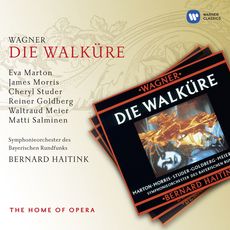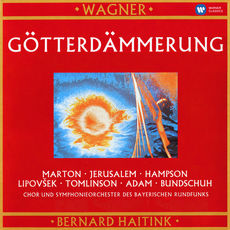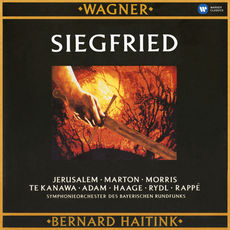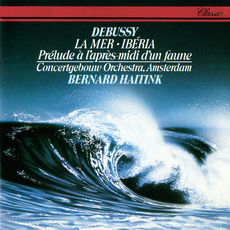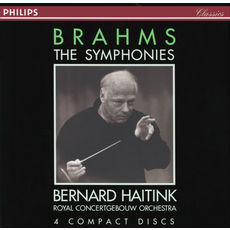Born in Amsterdam in 1929 into a wealthy family, the young Bernard Haitink was an avid follower of the Concertgebouw Orchestra conducted by Willem Mengelberg. Hiding under the music stand half the time due to air raids, he learned the violin and oboe at the conservatory in his hometown, rubbing shoulders with Jewish classmates whom he considered more talented than himself and whom he would never see again. Humble and modest, the young man always felt guilty for having benefited from a situation that put him in the limelight while better musicians than him never returned from the camps. In the early 1950s he joined the Dutch Radio Union Orchestra (now the Dutch Radio Orchestra) as a second violinist, while attending conducting classes organised by Dutch Radio, first with Felix Hupka, and later with the German conductor Ferdinand Leitner. The budding conductor quickly proved himself and was appointed second conductor of the Union Orchestra at the age of 26, dividing his time between four radio orchestras.
In 1956 Bernard Haitink was called in at short notice to replace Carlo Maria Giulini as conductor of the Concertgebouw. At first, he refused the invitation on the grounds that he was not ready to conduct the orchestra, but then he changed his mind, accepted the role, and proved a great success. This first outing at the head of the country's most prestigious orchestra did not go unnoticed. He became the principal conductor of the Radio Orchestra, then conducted in Great Britain for the first time in 1959 on a tour with the Concertgebouw, standing in for Eduard van Beinum, whose shocking death shortly thereafter came as a terrible surprise. Stunned by their loss, the famous orchestra appointed Eugen Jochum and Bernard Haitink as co-conductors in 1961, believing that the latter was still too inexperienced to take over the reins alone. But two years later, he became the orchestra's main conductor and enjoyed the success that ensured his fame to this day.
A passionate collaboration
From then on, as in Berlin with Karajan, in Philadelphia with Ormandy or in Geneva with Ansermet, for more than a quarter of a century, Bernard Haitink's name became inseparable from that of his orchestra, with whom he undertook a long series of recordings, including most notably the works of Anton Bruckner and Gustav Mahler. Under Mengelberg's direction, the Concertgebouw had specialised to some extent in the music of Mahler, whose works were still struggling to gain recognition. As for Bruckner, Haitink always said that he had felt inexplicably drawn to his music since he was a teenager. His complete Bruckner symphonies caused a sensation as soon as they were released and they immediately became the standard edition of that material, alongside the work of Eugen Jochum, the benchmark recording of the time. The grandeur of Haitink's vision, the powerful and refined sound of the Concertgebouw and the clear and natural recording by Philips created a great musical and sonic novelty. At the same time, between 1962 and 1971, the conductor and his orchestra undertook a masterly complete recording of Gustav Mahler's symphonies, which is still very much relevant today.
These two exceptional cycles were carefully remastered and published in 2019 as a gift for the old chief on the occasion of his 90th birthday. The physical box set includes the original edition covers. Both albums appear below with some new isolated versions recorded later in Amsterdam, including a sumptuous version of Bruckner’s Ninth Symphony recorded digitally in the early 1980s. Throughout his career, Haitink has made many other recordings, both in the studio and live, of these two composers. He has made these with orchestras in Berlin, Chicago, London, Dresden and Munich, and it can be a bit of a challenge for a fan to manage to listen to all of them.
An (almost) cloudless marriage
Haitink's long association with the Concertgebouw Orchestra went smoothly until the early 1980s, when the conductor threatened to resign and never conduct in his homeland again in protest against subsidy cuts the Dutch government wanted to impose. The situation was eventually resolved and Haitink remained in his post until 1988. In 1999 he was appointed honorary conductor of the Concertgebouw, but in 2014 he requested in the press that he be stripped of this honorary title and no longer be invited to conduct, this time as a protest against the administrative management of the orchestra. The following year, everything calmed down when the Concertgebouw called on him again to conduct in the 2016-2017 season. However, it is the Dutch Radio Orchestra that Bernard Haitink would select for his final concert in Amsterdam in June 2019, as if to complete the circle by returning to the orchestra that supported his début and offered him his first role.
A chief at the opera
Although he is—correctly—seen as essentially a concert conductor, Bernard Haitink has nevertheless been very active in opera, first as Music Director of the Glyndebourne Festival for 10 years, from 1978 to 1988, before occupying the same position at the Royal Opera House in Covent Garden from 1987 to 2002, where his musical talent was unanimously acclaimed. He was also applauded in the pit of the Zurich Opera and at the Théâtre des Champs-Elysées in Paris, notably for a memorable version of Claude Debussy's Pelléas et Mélisande, a work he adored above all others.
In 2009, increasingly annoyed by the directorial decisions he was witnessing from his pulpit, he declared, not without a sense of humour, that he was closing his eyes to immerse himself in the music. This strategy proved particularly useful at Covent Garden when Brünnhilde appeared on the set wearing a short sports skirt and a bodysuit with a skeleton printed on it!
There are several operatic successes in his discography, notably an absolutely remarkable complete Ring recorded in Munich; a Magic Flute; The Marriage of Figaro which he recorded on the stage at Glyndebourne; an admirable Fidelio with Jessye Norman; and a very sensitive rendition of Pelléas (not available in digital format) with Anne Sofie von Otter, Wolfgang Holzmaïr and Laurent Naouri and the Orchestre National de France, which he loved so much and which he conducted from his international debut in 1961 until his last appearance in February 2015 in the new Radio France hall, conducting a moving version of Bruckner's Ninth Symphony.
A worldwide reputation
For a long time considered a good craftsman though lacking in charisma and personality, Bernard Haitink slowly made his way into the very exclusive world of the great conductors of the second half of the 20th century and the beginning of our own. Certainly his profound modesty sometimes bordered on a kind of austerity. He was a reserved and withdrawn person, never ostentatious. All his art started from within himself and was communicated to the musicians and the audience without unnecessary words. He never raised his voice during rehearsals, never gesticulated or had his picture taken on a private jet or in a luxury yacht surrounded by the world's great and good. His art is often praised in terms of its integrity, a reductive term given the musical density and magnetic force emanating from him.
With immense sensitivity, he was entirely made of music, in defiance of a surface sociability that was not like him. At his first concert with the New York Philharmonic in January 1975, the critic Harold C. Schonberg wrote these amusing lines in the New York Times the following day:
“He does not dance, he does not patronize the best tailor on the Continent. But he is a dedicated musician, always on top of the music, getting exactly what he wants from his players.”
After leaving the Concertgebouw, Bernard Haitink took on new roles, with such outfits as the London Philharmonic Orchestra, the Dresden Staatskapelle and, in recent years, the Chicago Symphony Orchestra, with whom he recorded new versions of Mahler's works. He felt he had a calling to teach music to younger generations: he gave masterclasses in conducting and worked with the Chamber Orchestra of Europe, conducting, among others, Beethoven's Symphonies with a small ensemble. This allowed him to take a new, more musicological and dynamic approach, radically challenging his own conceptions. Bernard Haitink was also a regular guest of the Vienna and Berlin Philharmonics, the London Symphony and the Boston Symphony.
Then came Shostakovich
By chance or necessity, Bernard Haitink conducted a Shostakovich symphony in front of the composer in the same year that he died in 1975. “I met him only once; he was sick by that time—it was the last year of his life. We had a talk—he was a nervous man, wary.” According to Haitink, Shostakovich declared his gratitude and emotion to the Dutch conductor, who was also gripped by the emotion of this meeting. At that time, Haitink knew little of the Soviet composer's music, with the exception of Symphonies Nos. 5 and 8. A year later, a manager of the London Philharmonic Orchestra suggested to Bernard Haitink that he record the Tenth Symphony, which he did not know. "I don't know, but let's look at it", he replied. This is how the recording of the complete cycle began, first with the LPO and then with the Concertgebouw. "I'm not sure I like all of Shostakovich's symphonies", Haitink later admitted, considering them uneven and preferring the quartet cycle, which he found superior. Yet Haitink's complete works are the high point of the Shostakovich discography. He often conducted Shostakovich in concert, especially the Symphony Nos. 4 and 15, which were his favourites.
An abundant discography
The complete discography of Bernard Haitink is yet to be compiled. At the beginning of the sixties, his output collided with the boom of the classical record and the turn to recording material in stereo. His career then continued through the advent of digital and the compact disc in the early 1980s, when people began to re-record frantically.
At the same time, Bernard Haitink's art evolved and deepened, and his desire to record other composers began to grow. Take, for example, the very exciting recordings of Anton Dvorak's symphonies, Janacek's Jenufa, a beautiful rendition of the Symphony No. 4 by Brahms in Boston or Debussy's works, which rank among the best versions of La Mer and Jeux. As mentioned above, new recordings of Haitink's favourite repertoire, especially involving Bruckner and Mahler, alongside other orchestras are also to be welcomed, including a grand version of the latter's Symphony No. 6 with the Berlin Philharmonic.
Finally, let us not forget the rare recordings of Haitink accompanying soloists such as the superb complete Beethoven concertos with Murray Perahia. These two were made for each other and prove it in this splendid cycle. Other highlights include the Brahms piano concertos with Claudio Arrau and Vladimir Ashkenazy, the Brahms Violin Concerto with Henryk Szeryng, the Double Concerto for Violin and Cello with Itzhak Perlman and Mstislav Rostropovitch. Of course, Bernard Haitink has also recorded several Beethoven and Brahms cycles in both Amsterdam and London, but these are not his most notable achievements.
Of this plethora of recordings of almost-always superlative musical and sound quality, there are many more that deserve mention: Bizet, Vaughan Williams, Elgar, Strauss, Stravinsky, Ravel, Martin. Bernard Haitink has never ventured any further into the later 20th century and, regrettably, has never included Sibelius's music in his repertoire.
New editions are likely to appear following his death. Decca released an In Memoriam album just one week after his death and Warner has followed suit with a selection containing 52 tracks and almost 5 hours of music.
The farewell symphony
Tired of old age, but still in possession of his intellectual powers, Bernard Haitink decided to retire, declaring that every conductor has an expiry date. After falling from his podium while taking a bow at the end of a concert in Amsterdam in 2018, he then wisely decided that 2019, the year of his ninetieth birthday, would mark the end of his activity, with neither speeches nor social events. It was the Symphony No. 7 by his beloved Anton Bruckner that he chose for the end of a career that spanned more than 65 years in music: Brucker was, after all, the composer he loved above all others. And Bruckner was present at Bernard Haitink's farewell, first on 9 May 2019 in Berlin with the Philharmoniker, and then on 15 June for a final concert in Amsterdam at the head of the Dutch Radio Orchestra, where he started in 1954.
He then conducted the symphony several times with the Vienna Philharmonic Orchestra. The orchestra became a little more emotional with each concert, on 30 and 31 August at the Salzburg Festival, on 3 September at the London Proms and on 6 September 2019 at the Lucerne Festival. While all these concerts were, as one might imagine, perfectly successful, the Lucerne concert aroused emotion in a singular way. With the brisk tempi that were always his hallmark, Haitink carried the Viennese players along, unleashing a gigantic crescendo in the coda of the Finale, as if the whole orchestra and the whole hall were about to take to the sky. The orchestra is shaken by the power of the tremolos of its fantastic string section; the brass throws caution to the wind and the timpani are full of serious but jubilant solemnity. At the time of writing, only the Salzburg concert has been released (on DVD and BluRay), at the risk of creating confusion, as it is being marketed as The Last Concert. Let's hope that the one in Lucerne will be available soon. If you look hard enough on the web, you should be able to listen to it while we wait for a commercial release—which should not take long!
True to his word, Bernard Haitink retired and fell asleep peacefully at his London home, surrounded by his wife and five children on 21 October 2021. He had time to reflect on his status as a conductor in retirement, as he told a Guardian journalist who interviewed him in 2011:
“I have been doing this job for 50 years. And you know, it is a profession and it is not a profession. It's very obscure sometimes. What makes a good conductor? What is this thing about charisma? I'm still wondering after all these years.”
We cannot, of course, answer for him, but at the very most we can thank him for having brought us so much beauty and spirituality through all the music he performed, with the humility of a man who always stepped aside and let the works he was interpreting take centre stage. He did not like compliments and he invariably greeted them with a thin smile, insisting that he was “just a simple musician”...







